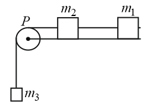The six forces, each, acting at a point are coplanar. If the angles between neighbouring forces are equal, then the resultant is

Important Questions on Laws of Motion
Assertion: Block is moving on horizontal surface towards right under action of force . All surfaces are smooth. At the instant shown, the force exerted by block on block is equal to net force on block .

Reason: From Newton's third law, the force exerted by block on is equal in magnitude to force exerted by block on .
Assertion: A man standing in a lift which is moving upward will feel his weight to be greater than when the lift was at rest.
Reason: If the acceleration of the lift is upwards, then the man of mass shall feel his weight to be equal to normal reaction exerted by the lift given by, (where, is acceleration due to gravity).
Assertion : According to the Newton's third law of motion, the magnitude of the action and reaction force in an action reaction pair is same only in an inertial frame of reference.
Reason : Newton's laws of motion are applicable in every inertial reference frame.
Assertion : Newton's second law of motion gives the measurement of force.
Reason : According to Newton's second law of motion, force is directly proportional to the rate of change of momentum.
Assertion: Mass is a measure of inertia of the body in linear motion.
Reason: Greater the mass, the greater is the force required to change its state of rest or uniform motion.
Assertion: The slope of momentum versus time curve give us the acceleration.
Reason: Acceleration is given by the rate of change of momentum.
A system consists of three masses and connected by a string passing over a pulley . The mass hangs freely and and are on a rough horizontal table (the coefficient of friction). The pulley is frictionless and of negligible mass. The downward acceleration of mass is (assume, ),

